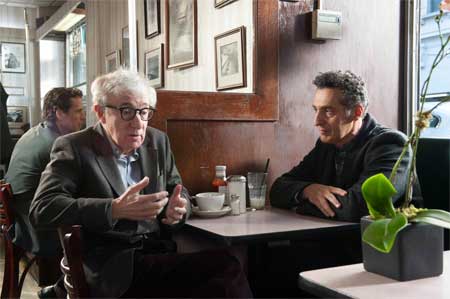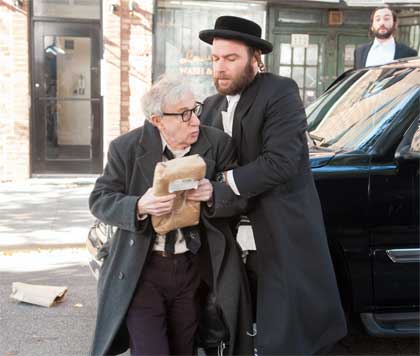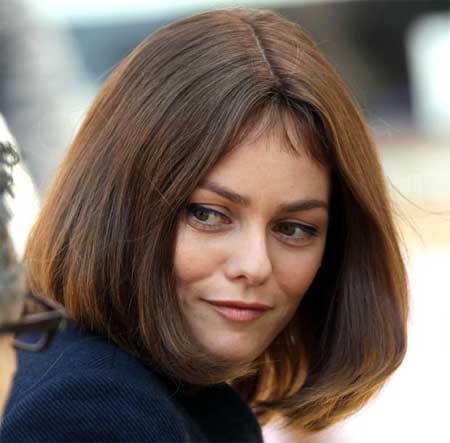Film (2013)
Written and directed by John Tunturro
Music by Abraham Laboriel, Bill Maxwell; Cinematography by Marco Pontecorvo; Film Editing by Simona Paggi
Kendall Square Cinema, Cambridge, MA
With John Turturro (Fioravante), Woody Allen (Murray), Vanessa Paradis (Avigal), Liev Schreiber (Dovi), Sharon Stone (Dr. Parker), Sofía Vergara (Selima)

John Tunturro as Fioravante
in “Fading Gigolo”
Photo: Courtesy of Millennium Entertainment
It begins with Fioravante (John Tunturro) and Murray (Woody Allen) speculating about the possibilities of getting into the gigolo biz. Murray is a natural operator, figuring he can make a buck once his bookstore has gone out of business by putting Fioravante to work in the sex trade. But it’s the elder sex trade, and Fioravante is certainly an elder. It all goes pretty well until Fioravante encounters someone who he begins to care about.
This is not visionary filmmaking, but it is playful, genial and certainly has its moments. It is, for chunks of it, also quite funny.
Director Tunturro has enlisted Woody Allen to play the setup guy. Allen rarely acts in films he does not himself direct. When he does, he falls naturally into his anxious, nebbishy, Woody Allen character-type; when the shoe fits, as it does here, it works very well. In The Front (1976), a more noble and more completely conceived film directed by Martin Ritt, Allen plays a role of a not dissimilar character type, realizing its potential brilliantly. Here, in Fading Gigolo, the role is not written quite as interestingly, but Allen fills the bill successfully.
Tunturro, as Fioravante, has a kind of sad sack demeanor which makes it possible for him, at once, to fit into clownish antics when engaged with Murray and then turn sweet, loving and sentimental when engaged with his clients.

in “Fading Gigolo”
Photo: Courtesy of Millennium Entertainment
Sharon Stone (Dr. Parker) and Sofia Vergara (Selima) play the initial ploys for engagement in the gigolo business, and fall into that very naturally. They are maturely seductive and playfully alluring and seem ready to welcome an unexpected, middle-aged, not all that hunky a guy into their beds.

Liev Schreiber as Dovi
in “Fading Gigolo”
Photo: Courtesy of Millennium Entertainment
The story gets more complex when Avigal (Vanessa Paradis), a rabbi’s widow in a Hasidic community, enters the scene. She has done some nitpicking (literally) for Murray’s nephew, and then gets drawn into a scheme by which she explores the sensuous possibilities of the “massage therapist” that Murray, in an improvisational moment, has recommended. Of course, it is Fioravante who has quickly to set up a massage table and gently draws Avigal in.
The story that develops between them is indeed unexpected and unexpectedly sweet. Its tone differs so dramatically from that of the early boisterous goings on that it changes the tenor of the tale, but not disruptively. Paradis does a good job as the widow: sensuous, noble with obvious restraint but a genuine sense of humanity. The scene in which she appears before a rabbinic court is beautifully done.
Liev Schreiber (Dovi) has a significant role as a member of the local Hasidic security force who is also sweet on Avigal; he does a convincing job as a frustrated heavy, but not an inhumane one.

in “Fading Gigolo”
Photo: Courtesy of Millennium Entertainment
After the scene in the rabbinic courts, the film does not quite know where to go. The denouement is at first satisfying, then ambiguous, yielding a result that is less than satisfying; it gives the sense that Tunturro has not quite found a trajectory for his tale and leaves it in the basket instead.
This film turns out to be quite a bit more entertaining and appealing than I had anticipated. The tone wanders a bit, the moral curve is not as well framed as it might be, but it is funny, endearing and gently offbeat.
– BADMan
Leave a Reply